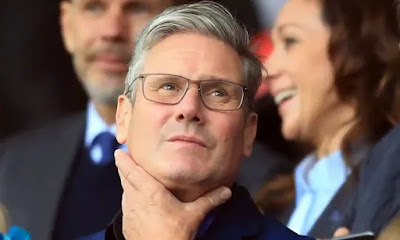What happened to the post-Corbyn vision for
Labour? Keir Starmer offers nothing
Neal Lawson
We need bold ideas, courage and hope, but timidity and
backpedaling are the hallmarks of this Labour leadership
Thu 28 Jul 2022 17.18 BST
We live in
an age of perpetual conflict. The global crash, the pandemic and now war and
the cost of living crisis have shown us our economic and political systems are
not fit for such chaotic times. The tide is now going out on one era, and the
Labour party seems to have been left behind. It appears perpetually out of
step, most recently when it sacked MP Sam Tarry, the now former Labour
transport spokesperson who dared to stand on a picket line with striking
workers, and lost his job shortly afterwards.
Labour in
its post-Corbyn period is desperately searching for a playbook that will win it
the next election, or at least keep it electorally afloat. But the only one to
hand is apparently New Labour’s – and they offer a desiccated, joyless, and
stripped bare version of that more interesting but long-gone moment.
Keir
Starmer’s game isn’t to inspire with hope and a grand vision, but to play a
glorified game of whack-a-mole with every possible Tory attack line. He
promises, for example, “no magic money tree economics”, no nationalisation of
public services, that Labour won’t talk to the SNP or deal with Liberal
Democrats. And the unions must be held at arm’s length so as not to frighten
the horses of the right or some fictional middle England swing voter. When
really, even the more conservative voters he hopes to reach are concerned about
wages and the cost of living.
Labour puts
itself in a terrible position. It won’t spend its way out of the cost of living
crisis and the recession to come because it’s busy tying itself up in orthodox
Treasury knots, spewing out the line that governments are like households and
can’t spend what they don’t have. Which is absurd, first, because households
often spend what they don’t have, not least through mortgages. Governments can
both borrow like that (with better rates and terms) or they can print money –
as they did throughout Covid. But Labour is determinedly shutting this door,
play-acting at what it thinks political grownups do.
It is also
shutting the door on one of the best solutions to the cost of living crisis.
One of the jobs of a union is to negotiate better wages from company profits,
and it’s clear people are willing to go on strike rather than suffer
eye-watering real wage cuts that leave their families short. It is the job of
the party of labour to back them. To be clear, none of this is some Scargillite
game of revolutionary toy soldiers. This is ordinary union action, using
methods – such as strikes – familiar to all and protected by law. Moreover,
this is a real-life crisis for millions of scared ordinary people. Labour
cannot afford to be seen as anything but on their side.
The Starmer
project, if we can give it such a grand title, knows how brittle and exposed it
is in all this. It won on a Corbynism-without-Corbyn ticket and then ruthlessly
and cynically kicked that all away. What matters here isn’t an adherence to
Corbyn himself, but an analysis of the current situation, and a set of ideas
and movements that stand at least a chance of addressing the age we now live
in. Jeremy Corbyn was an implausible leader, but there were genuinely popular
ideas and a willingness to take on modern challenges found in his movement. Not
least revitalising trade unionism.
Enter
Tarry, one of the stormtroopers for Corbyn’s leadership and an advocate of
Labour backing people who actually labour (in 2010 Tarry and I both worked for
the campaigning organisation Compass). This landed him in the crosshairs of the
leadership’s panicked attempts to both rid the party of any voices of hope and
reason, and pivot back to a sixth-form play of the New Labour era. It will not
work.
What would work,
or at least stand a chance, is to learn the lessons of Joe Biden in the US and
Olaf Scholz in Germany, who both embraced the left of their parties and at
least enjoyed the electoral spoils. What also works is the way Andy Burnham has
used the platform of mayor in Greater Manchester to address the cost of living
crisis via ownership and control of the buses and therefore lower fares.
Burnham has also made democracy and proportional representation a first-order
issue by saying that whatever we want, we won’t get it until we change the
political system. Or the way that Mark Drakeford, the Labour leader of Wales,
has put ideas such as a universal basic income on the map.
Meanwhile
Labour turns its face against the moment. Complacency about a Liz Truss premiership
could rebound in the way the left’s complacency about Margaret Thatcher’s
election to the Tory leadership did in 1975. Parties have to win office to do
anything. But without a purpose, a vision and hope, Labour is doomed to fail at
that.
But that’s
not the worst of it. Rachel Wolf, a former Conservative adviser, wrote recently
about “the spectre of a rise in populism haunting (us)”. If the Tories continue
to crash and Labour fails to offer any desirable or feasible alternative,
waiting in the wings is something much worse.
The choice
between a terrible party and a less terrible one is no choice at all – not when
the planet burns, and people are starving. Maybe the widespread reaction to
Tarry’s sacking will be a wake-up call. It can never be too late.
Neal Lawson
is director of the cross-party campaign organisation Compass





Sem comentários:
Enviar um comentário